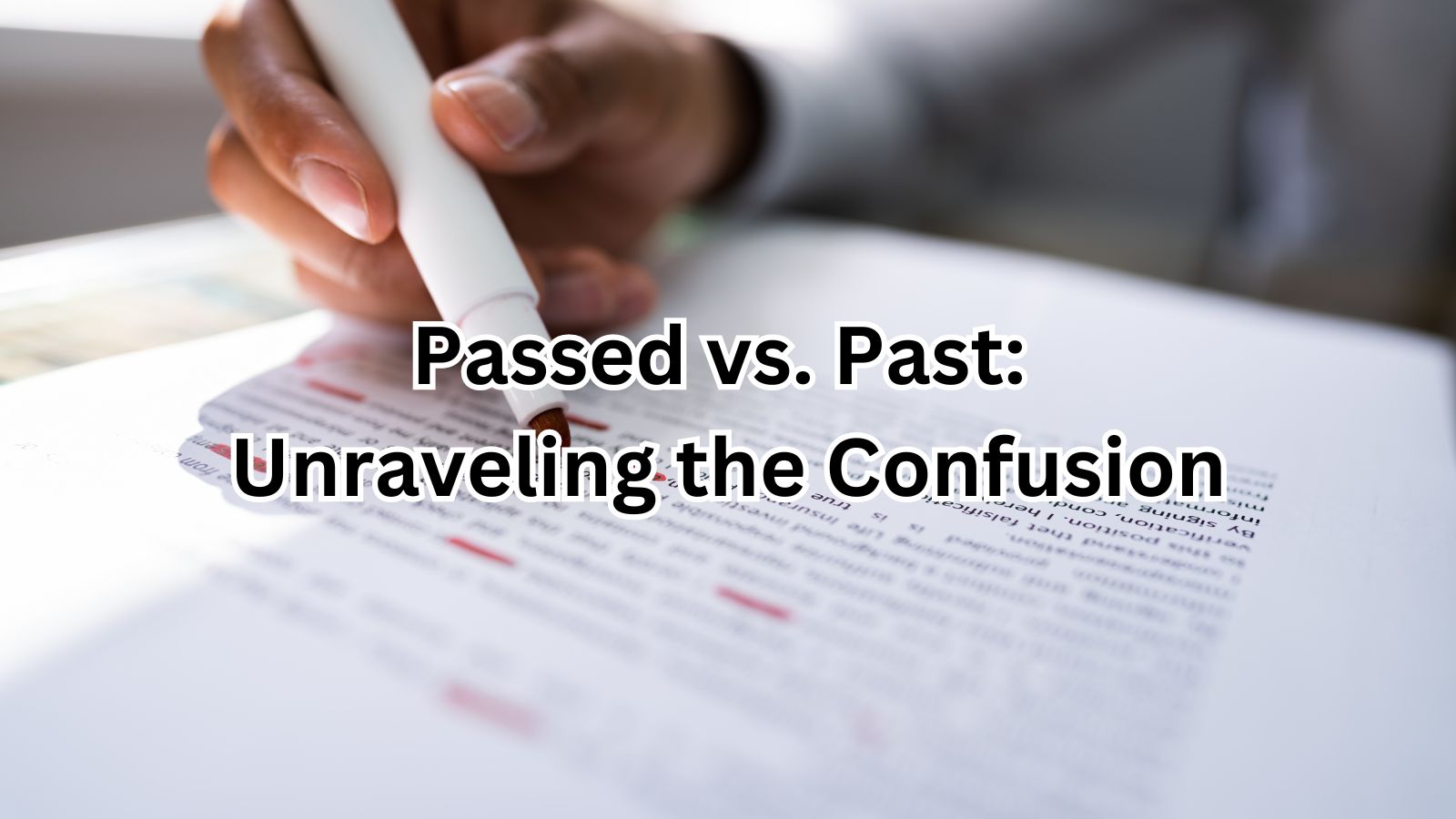Passed vs. Past: Unraveling the Confusion
Have you ever found yourself second-guessing whether to use “passed” or “past” in a sentence? You’re not alone. These two words are homophones, meaning they sound the same but have different spellings and meanings. In this blog post, we’ll explore the differences between “passed” and “past,” provide examples of their usage, and offer tips to help you master these commonly confused words.
How to use Passed
What is “Passed”? “Passed” is the past tense and past participle of the verb “pass.” It is used to describe an action or event that has already happened or to indicate that something has been moved or transferred from one place, person, or state to another. For example:
- The teacher passed out the test papers to the students.
- He passed the ball to his teammate during the game.
- She passed the exam with flying colors.
How to Use Past
What is “Past”? “Past” can be used as a noun, adjective, or preposition. As a noun, it refers to a time that has already occurred or an earlier period in history. As an adjective, it describes something that happened or existed before the present time. As a preposition, it indicates movement beyond or further than a particular point in space or time. Here are some examples:
- Noun: In the past, people relied on horses for transportation.
- Adjective: The company’s past performance has been impressive.
- Preposition: The runner sprinted past the finish line.
Common Phrases and Idioms: To further illustrate the differences between “passed” and “past,” let’s look at some common phrases and idioms that use these words.
- “Passed away” means that someone has died. Example: His grandfather passed away last year.
- “Passed down” refers to something that has been transmitted from one generation to another. Example: The family recipe has been passed down for generations.
- “Past one’s prime” suggests that someone or something is no longer at their peak performance. Example: The athlete, once a champion, is now past his prime.
- “Past the point of no return” implies that it’s too late to stop or reverse a course of action. Example: The project was past the point of no return, and the team had to see it through.
Tips for Using “Passed” and “Past”:
- Use “passed” when describing an action or event that has already happened.
- Use “past” when referring to a time before the present or indicating a location beyond a certain point.
- If you’re unsure, try replacing the word with “moved” or “transferred.” If it makes sense, use “passed.”
- When in doubt, consult a dictionary or grammar resource to double-check the appropriate usage.
Mastering the difference between “passed” and “past” is essential for clear and effective communication. By understanding their distinct meanings and using them correctly in context, you can avoid confusion and convey your intended message with precision. Remember, “passed” is a verb that describes an action or event, while “past” can function as a noun, adjective, or preposition, referring to time or location. With practice and attention to detail, you’ll be able to confidently navigate the world of “passed” and “past.”
Etymology
The words “passed” and “past” have different etymologies, although they are related to the same root word.
Passed: “Passed” is the past tense and past participle of the verb “pass.” The word “pass” originated from the Old French word “passer,” which meant “to go by” or “to cross over.” The Old French “passer” derived from the Vulgar Latin “*passare,” a variant of the Latin “passus,” which was the past participle of the verb “pandere,” meaning “to stretch, spread, or extend.”
Past: “Past” originated from the Old English word “pæst,” which was an adverb meaning “so as to pass” or “by.” The Old English “pæst” derived from the Proto-Germanic “*pæst,” which was related to the Proto-Germanic “*pæssō,” meaning “pace, step, or track.” The Proto-Germanic words are believed to have stemmed from the same Latin root “passus,” which, as mentioned earlier, was the past participle of “pandere.”
Over time, the meanings of “passed” and “past” have evolved and diverged, with “passed” primarily functioning as a verb and “past” serving as an adjective, noun, or preposition.
In summary, while both “passed” and “past” have roots in the Latin word “passus,” they entered the English language through different routes: “passed” through Old French and “past” through Old English, ultimately leading to their distinct uses in modern English.
- Story Structure: How the Save the Cat! Method Can Transform Your Writing - April 23, 2025
- HALFWAY TO HALLOWEEN: 50 Words of Horror Contest - April 22, 2025
- How to Edit your poetry for beginners and beyond (with worksheet) - April 18, 2025







